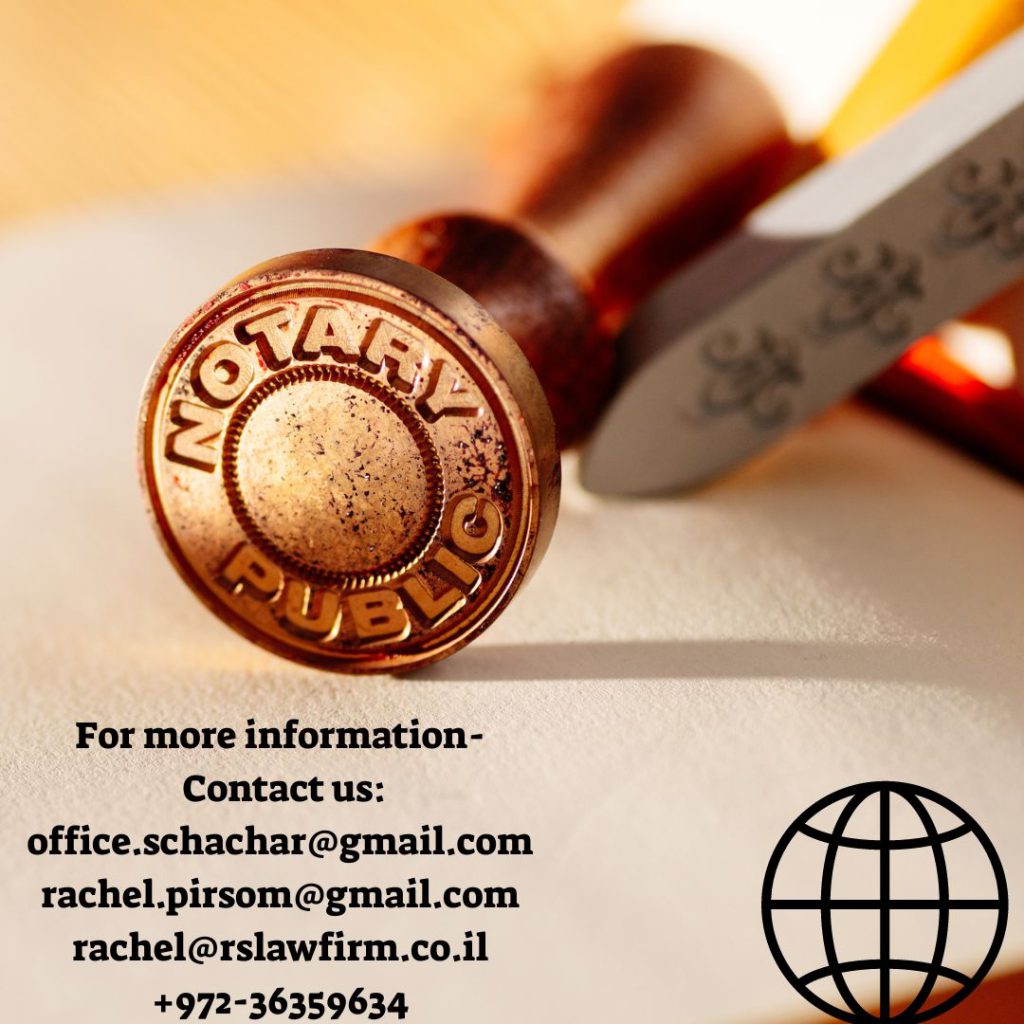In a world where global mobility is on the rise, individuals often find themselves in need of navigating bureaucratic processes when moving to a new country. In the context of Israel, the Ministry of the Interior plays a pivotal role in regulating the status of foreign nationals. When individuals from foreign countries must undergo visa procedures and status adjustments, they encounter a crucial requirement: the translation and notarization of their foreign documents. These documents, produced in a foreign language, cannot be accepted by the Ministry of the Interior in their original form. Instead, they must go through a meticulous process of translation and notarization, and often require international authentication, such as an apostille, in the country of origin.

| Situation/Scenario | Common Documents Needed | Additional Information |
| Foreign Workers | Passport, Visa, Employment Docs | Required for foreign nationals working in Israel. |
| Spouses of Israeli Citizens | Marriage Certificate, Passport | Necessary for foreign spouses to establish Israeli status. |
| Minor Children of Foreign Spouses | Birth Certificates | Children of foreign spouses may need special permits. |
| Civil Marriages Abroad | Civil Marriage Certificate | Proof of foreign civil marriages for legal recognition. |
When are Documents Required for the Ministry of the Interior?
Foreign documents are typically required in cases where individuals seek to regulate their civil status in Israel. These scenarios encompass a broad range of situations, including:
- Foreign Workers: Individuals attempting to regulate their status as foreign workers in Israel.
- Spouses of Israeli Citizens: Foreign nationals seeking to establish their status as spouses of Israeli citizens.
- Minor Children of Foreign Spouses: Minors who are children of foreign spouses of Israeli citizens.
Additionally, there are instances outside of these common scenarios where foreign documents may be necessary. For example:
- Couples who were married through civil ceremonies abroad.
- Israelis who have lived abroad and experienced significant life changes during their time away, such as marriage, divorce, birth of children, or the passing of loved ones.
The Significance of International Validation
Some of the documents required by the Ministry of the Interior are official documents issued by foreign countries, including marriage and divorce certificates, death certificates, birth certificates, integrity certificates, and more. In other cases, these documents are generated by recognized foreign institutions, such as universities or regulated workplaces, rental contracts, or other legal agreements. In some instances, documents may not have inherent legal or official status but must attain such recognition to serve as evidence for the Ministry of the Interior, especially in matters related to marital status.
| Document Type | Apostille Stamp Requirement | Process for Non-Hague Convention Countries |
| Marriage Certificates | Yes (for recognized countries) | Authentication process may require embassy involvement. |
| Birth Certificates | Yes (for recognized countries) | Additional steps like Ministry of Foreign Affairs stamp. |
| Official Agreements | Yes (for recognized countries) | Verification may vary, consult local authorities. |
When documents are considered official, they must bear an apostille stamp or an equivalent form of authentication from the country of origin. For instance, if a couple is married through a civil ceremony in a foreign country, they must have the marriage certificate stamped with an apostille before returning to Israel. This stamp certifies the document’s validity within the country where it originated.
Verification of Documents from Non-Hague Convention Countries
It’s important to note that an apostille stamp is only recognized in countries that are signatories to the 1961 Hague Convention. If a document is from a country that is not a signatory to this convention, it requires alternative methods of authentication to gain international validity. Many times, this involves obtaining a stamp from the Ministry of Foreign Affairs in the document’s country of origin and subsequently having it authenticated at the Israeli embassy in that country.
The Role of Notary Translation and Signature
Upon returning to Israel, foreign documents must undergo translation into a language recognized by the Ministry of the Interior. In Israel, the official languages are Hebrew and Arabic. Generally, documents in these languages do not require translation into Hebrew. However, if a document is in a different language, it must be translated into Hebrew by a notary for the Ministry of the Interior.

| Document Type | Translation into Hebrew/English | Notary’s Responsibilities |
| Foreign Documents | Required | Ensures linguistic accuracy and completeness. |
| Apostille Translation | Mandatory for foreign documents | Translates and includes the apostille in translation. |
| Verification Process | Part of the translation process | Validates the document for the Ministry of Interior. |
A notary, typically an experienced lawyer with special permission from the state, possesses proficiency in both the language of the document and Hebrew. Notaries often undertake the translation themselves to ensure its correctness. Once translated, the document receives the notary’s seal. The original document and its translation are then bound together with red tape and stamped with the notary’s seal, as per the guidelines provided by the Ministry of Justice. Care must be taken to prevent any damage to the seal during this process.
For official documents that have received an apostille stamp from a foreign country, the notary must also translate the apostille stamp as part of the document’s translation. In cases of non-official documents, such as letters from family members or friends providing evidence of marital relationships, an apostille stamp may not always be required.
Commencing a New Chapter
Embarking on a journey to a new country can be a transformative and exhilarating experience. Whether the move is motivated by work, education, or personal reasons, it signifies the beginning of a new life chapter. However, before the rewards of life in a new country can be fully realized, there are essential procedures to navigate.
For individuals seeking to immigrate to Israel, one of the most significant steps is securing immigrant status from the Ministry of the Interior. While this process may initially seem daunting, with proper preparation and guidance, it can be successfully managed.
The journey toward a new life commences with careful planning and thorough preparation. Individuals aiming to immigrate to Israel must ensure that all required documents are correctly prepared and submitted. These documents encompass identification materials, such as passports and birth certificates, as well as various permits and proof of income. Additionally, applicants may need to provide evidence of their ties to Israel, such as family connections or employment prospects.
| Document Type | Purpose | Importance in the Immigration Process |
| Passport | Establishes identity for visa process | Fundamental for proving identity and citizenship. |
| Birth Certificate | Provides date and place of birth | Essential for confirming personal details. |
| Police Clearance | Confirms no criminal convictions | Ensures the applicant meets legal requirements. |
| Financial Proof | Demonstrates financial stability | Validates the ability to support oneself in Israel. |
| Medical Certificate | Verifies good health | Ensures public health and safety in Israel. |
| Ties to Israel | Shows connections to Israel | Strengthens the case for immigration approval. |
Essential Documents Required
The process of obtaining immigrant status from the Ministry of the Interior necessitates several critical documents for verification purposes. These documents are indispensable for confirming the applicant’s identity, financial resources, and connections to Israel. Some of the key documents needed for an immigration application include:
- Valid Passport: A passport is essential to establish the applicant’s identity.
- Birth Certificate: A birth certificate helps verify the applicant’s date and place of birth.
- Police Clearance Certificate: This certificate attests that the applicant has not been convicted of any criminal offenses.
- Financial Resources Proof: Documents such as bank statements or proof of income are required to demonstrate the financial capacity to support oneself and dependents in Israel.
- Medical Certificate: This certificate indicates that the applicant is in good health and does not pose a public health risk in Israel.
- Ties to Israel: Evidence of connections to Israel, such as marriage certificates, birth certificates of children born in Israel, letters of invitation from employers, or proof of Hebrew language proficiency.

| Challenge | Solutions and Strategies |
| Language Barrier | Translation services, assistance from Hebrew speaker. |
| Financial Requirements | Explore financial assistance programs, job offers. |
| Long Processing Times | Begin early, submit documents promptly, and stay in contact with the Ministry of the Interior. |
Overcoming Common Challenges
While having the necessary documents is crucial, the immigration application process can present challenges for applicants. Here are some common obstacles and strategies to overcome them:
- Language Barrier: For non-Hebrew speakers, navigating the application process can be challenging, as many forms and documents are in Hebrew. Seek assistance from translation services or enlist the help of a Hebrew-speaking friend or family member.
- Financial Requirements: Meeting the financial requirements can be demanding. Explore financial assistance programs and consider alternative ways to demonstrate financial stability, such as presenting a job offer in Israel.
- Long Processing Times: The immigration application process can be lengthy. Begin the process early, submit documents accurately and promptly, and maintain regular communication with the Ministry of the Interior to expedite processing.
Conclusion: Embracing a New Beginning
Acquiring immigrant status in Israel represents a significant milestone in the journey to a new life. While the immigration application process may seem complex, it is essential to remain focused on the end goal and persistently overcome any challenges that arise.
| Language of Original Document | Language of Notarized Translation | Notary’s Responsibility |
| Any language | Hebrew or English | Accurate translation and notarization. |
| Apostille Content | Same as Original Document | Includes apostille in translation. |
For immigrants, a new chapter awaits, filled with opportunities for personal growth and unique experiences. Whether embarking on a new career, immersing oneself in a different culture, or building a new community, the possibilities in Israel are boundless.
Immigrants are encouraged to make the most of available resources and support, including language classes and community organizations. By building strong networks and engaging with the local community, immigrants can establish a sense of belonging and thrive in their new home.
Regulating one’s status as a foreign spouse often requires the presentation of specific documents. These documents include, but are not limited to, the birth certificate, bachelor’s certificate, and criminal record. A comprehensive list can be found on our website.
Language of Notarized Translation
Documents must be translated by a notary into either Hebrew or English. The translation should encompass the content of any apostille present on the documents.
Authorized Notaries for Ministry of the Interior Translations
The Ministry of the Interior exclusively accepts translations by Israeli notaries. Documents translated in foreign countries are not recognized by the Ministry of the Interior.
Automated Translation for Ministry of the Interior Documents
The Ministry of the Interior treats translations with the utmost seriousness and promptly rejects improper translations, even if notarized. Therefore, it is strongly recommended to entrust the entire translation process to a qualified notary to ensure accuracy and compliance with the Ministry’s standards.

| Translation Source | Ministry of Interior Recognition | Quality Assurance |
| Israeli Notaries | Accepted | High quality and accuracy ensured. |
| Foreign Country | Not recognized | Ministry of Interior does not accept. |
| Translation Services | May vary depending on provider | Check credentials for quality assurance. |
Your Trusted Partner for Notarized Translations: Rachel Schachar Law & Notary Firm
I highly recommend Rachel Schachar Law & Notary Firm for all your notarized translation needs. With their wealth of experience and expertise in the field, this veteran firm has consistently delivered exceptional translation services in multiple languages and across various document types. Their commitment to precision and accuracy ensures that your documents will meet the highest standards, making them suitable for international use. Whether you require translations for personal documents, legal papers, or business agreements, Rachel Schachar Law & Notary Firm’s dedicated team will provide you with professional and reliable service. Trust in their proven track record and extensive knowledge in notarized translations, and you’ll find a dependable partner to assist you in navigating the complexities of global communication and documentation.




